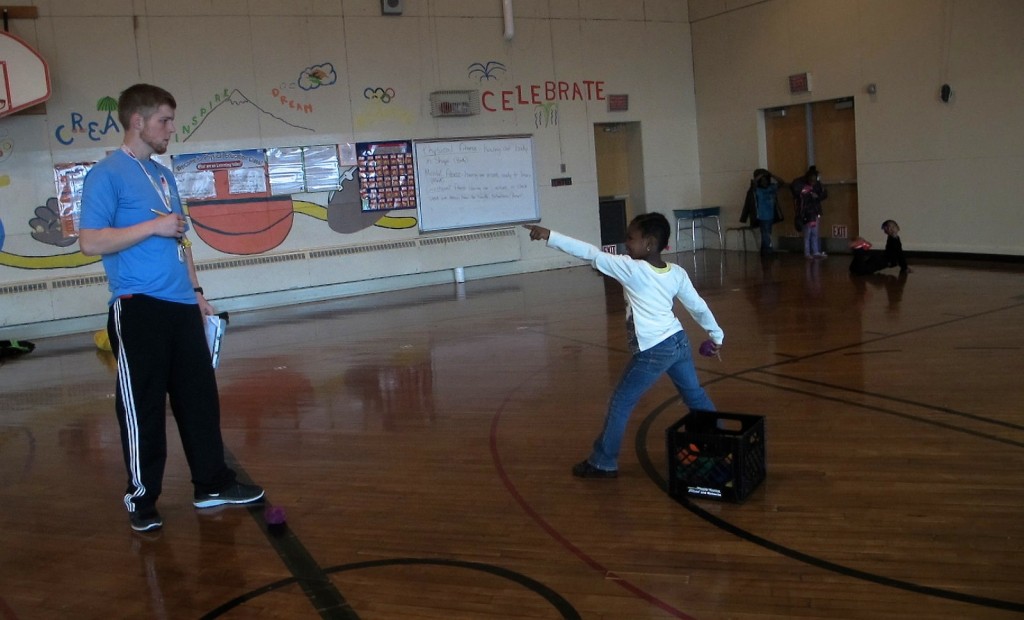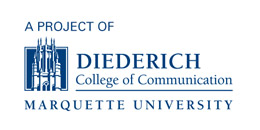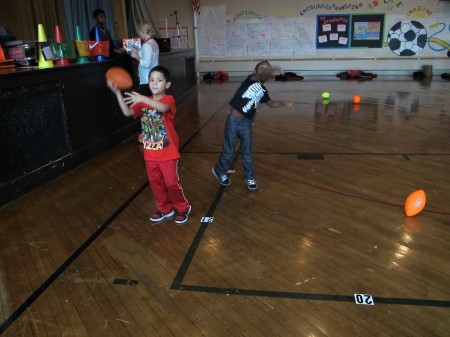
Siefert Elementary School physical education teacher Joe Pitsch works with a first grader on his throwing skills using the “step, point, throw” technique. (Photo by Raina J. Johnson)
Tracey Nix landed her first teaching job in Chicago. She was surprised to find that many of her students lacked even basic food and clothing.
“It was a shock to me. I would see kids coming to school in the winter with holes in their shoes,” said Nix.
The shocks kept coming, but she and other school officials learned to manage them. “We’d keep snacks on us because a lot of the kids wouldn’t eat breakfast or would be late for school and miss breakfast and I couldn’t teach to hungry children,” Nix added.
The lessons Nix learned early in her career changed her views on urban education, parental involvement and what culturally responsive teaching looks like in the classroom. Now the director of the Institute for Urban Education (IUE), Nix is working to equip today’s education majors with what they need to be effective in urban settings.
Housed in the School of Education at the University of Wisconsin-Milwaukee, the IUE trains new teachers to challenge their own cultural and socioeconomic perceptions and biases by giving them assignments that immerse them in the communities in which they will be teaching. It attracts student teachers from many suburban University of Wisconsin System schools to learn how to “teach to the whole child,” Nix said.
“I came from Eau Claire, a rural setting that is very Caucasian,” said Joe Pitsch, the physical education teacher at Siefert Elementary School, 1547 N. 14th St. “I wanted to grow, and the IUE program and Milwaukee opened doors for me,” he added.
The IUE’s first cohort began in fall 2007 with 12 UW-System students. Now the program attracts more than 50 students each year from around the state.
“It’s not an easy program. The teachers are volunteering for this and have to deal with their own biases. They find their own housing and their own transportation,” Nix said. “Our students have to want to be here and they rise to the occasion,” she added.
The student teachers are mostly white women who come from middle-class families in rural areas. They enter the program in the spring or fall semester and are immersed in urban education with all of its challenges.
“Two of the biggest challenges I see … are behavior management, and making sure the kids know what to expect from me as their teacher,” said Pitsch. To combat those challenges, Pitsch had to learn to think creatively. “It’s all about building connections and relationships with the kids. I send out monthly newsletters to the parents and encourage being (physically) active for a lifetime,” he added.
In the IUE program, student teachers attend weekly seminars taught by current teachers and work in the classroom with cooperating Milwaukee Public Schools teachers.
“This year we’re working with over 20 schools and our cooperating teachers understand the need for our teachers to be here. They support us,” Nix said.
In addition to working with teacher candidates, IUE creates professional development opportunities for current teachers who work in an urban setting. IUE also collaborates with scholars from UW System institutions to advance research in urban education.
“Students go out into the neighborhoods, talk to people, and learn how to engage family members,” Nix said. And they bring those lessons back into the classroom with them. Pitsch said those assignments have helped him during his first year teaching in his own classroom. “I wanted to change the kids’ perception of what physical education was. All they knew was play.”
IUE students struggle with the lack of parental involvement, Nix said. “They often wonder why parents don’t come to parent-teacher conferences.” We teach them that they need to think creatively about engaging parents. They can try sending text messages or emails. They can visit parents at home or spend time talking with them when they come to school to pick up their children.
“Sending letters home doesn’t work for everybody,” she explained.







I am interested in the M Tech program